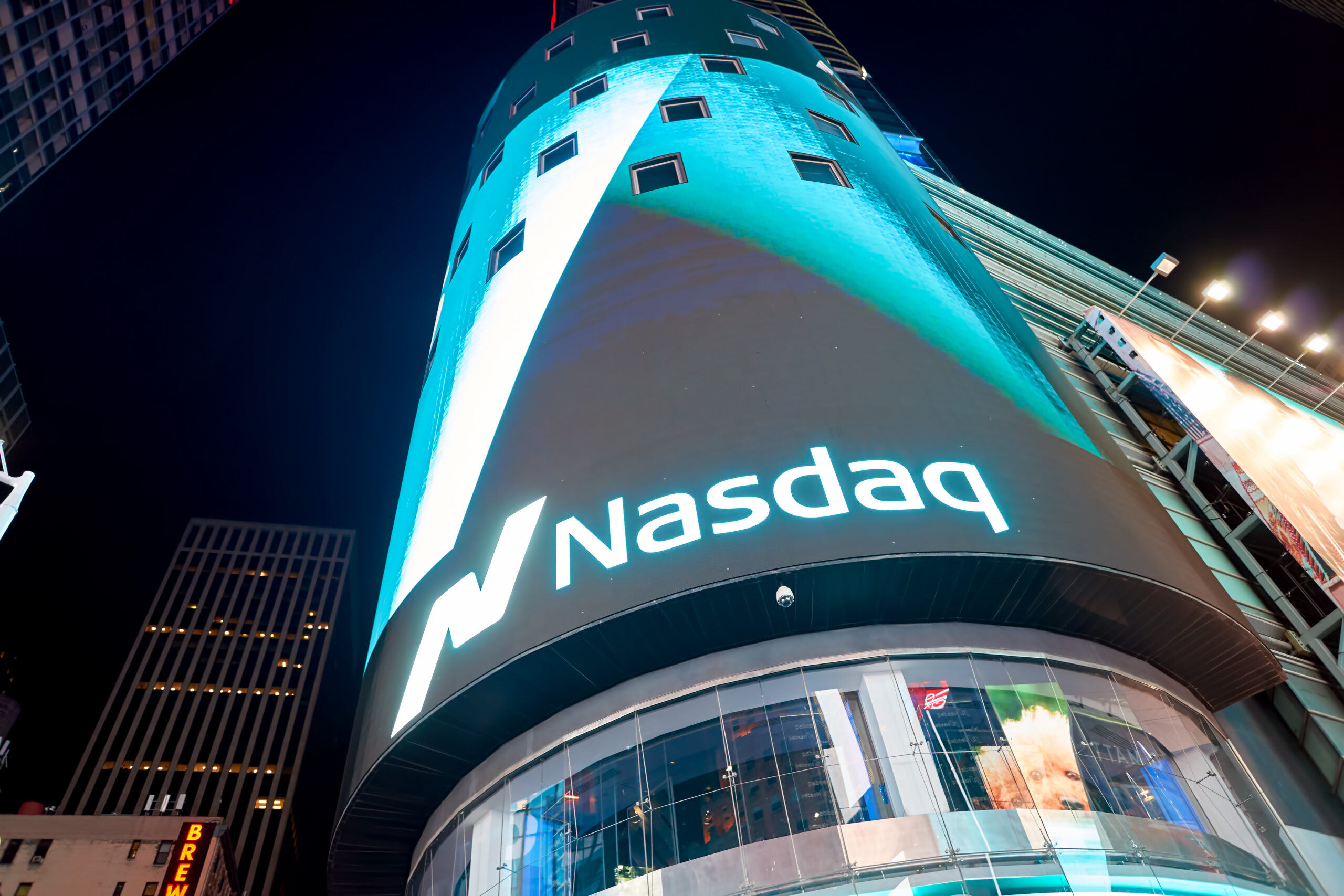Nasdaq statistics in 2023

The Nasdaq is the world’s largest electronic stock exchange and second-largest stock exchange globally in terms of market capitalization behind the New York Stock Exchange (NYSE). It was founded in 1971 and is headquartered in New York City. The Nasdaq stock exchange lists over 3,500 companies, including many of the world’s leading technology companies.
The Nasdaq Composite Index, which is the largest index on the Nasdaq, measures all domestic and international common type stocks. The market-capitalization-weighted index is the second-largest stock market index in the world, after the S&P 500.
In terms of performance, Nasdaq stocks have often outperformed the broader stock market, with the Nasdaq 100 doing better than the S&P 500 and the Dow Jones Industrial Average in recent years.
Here is a summary of key Nasdaq stocks statistics for 2023.
Key takeaways
More than 3,500 companies are listed on Nasdaq. Nasdaq’s listed companies have a total market capitalization of $25.3 trillion. Over 4.3 billion shares are traded daily on the Nasdaq exchange. Technology stocks make up more than half of companies in the Nasdaq Composite. The Nasdaq 100 index comprises the largest 100 companies traded on the Nasdaq, with nearly 60% being in the tech sector.Nasdaq stocks: market summary
1.There are over 3,500 companies listed on Nasdaq
More than 3,500 companies are listed on the NASDAQ stock market. According to this FactSheet by Nasdaq, these companies represent a wide variety of industries, including technology, healthcare, and financial services.
2. The market capitalization of the nasdaq stock market is $25.3 trillion
The total market capitalization of all Nasdaq stocks is $25.3 trillion (as of May 29, 2023). This is the second-largest market capitalization in the stock exchange industry, only behind the NYSE. Compared in terms of growth, the Nasdaq shows a faster pace since January 2018, when it had a market cap of about $11 trillion. The NYSE had a market cap of $23 trillion at the time.
3. Over $200 billion worth of stocks trade on Nasdaq daily
In 2023, an average of over $200 billion worth of stocks were traded on Nasdaq daily, with $290 billion traded on 25 May 2023.
4. An average of 4.3 billion shares are traded daily on Nasdaq
According to daily market data for Nasdaq, an average of 4.3 billion shares in volume are traded daily on the Nasdaq exchange.
5. There are over 1000 international stocks listed on the Nasdaq
There are a total of 1,000 foreign companies listed on the Nasdaq stock market. These companies represent a wide variety of countries, including China, India, and Japan.
Nasdaq markets and indices stats
6. Nasdaq operates 29 markets, a clearinghouse, and 5 central securities depositories
The Nasdaq’s operations encompass 29 markets for stocks, bonds, derivatives and commodities. It also operates a clearinghouse and five central securities depositories.
7. Nasdaq’s trading technology is used by over 100 exchanges globally
Nasdaq’s growth as a leading electronic stock exchange has seen its proprietary trading technology deployed by 100 exchanges across 50 countries.
8. Nasdaq trades under the ticker NDAQ and part of the S&P 500 since 2008
The Nasdaq Inc stock trades under the symbol NDAQ on the Nasdaq exchange. The company has also been a component of the S&P 500 Index since 2008.
9. The Nasdaq has two major indexes
Nasdaq has two major indexes that track the performance of Nasdaq stocks daily. There’s the Nasdaq Composite and the Nasdaq 100. The tech-heavy Nasdaq Composite tracks most securities on the Nasdaq exchange (except for mutual funds, preferred stocks, and derivatives).
10. More than half of Nasdaq Composite stocks are tech companies
Tech stocks account for 52% of the total market weight of Nasdaq Composite, with 457 tech companies currently making up the index. Consumer Discretionary is next with about 18% and 450 stocks while healthcare is the third largest with 9% and 1,078 companies.
11. About 6 out of 10 companies in Nasdaq 100 are tech stocks
Nearly 60%, or approximately six out of every 10 of the companies that make up the Nasdaq 100 are in the technology sector.
12. Apple is the top stock by market capitalization in the Nasdaq Composite
The top 3 components on the Nasdaq Composite are Apple, Microsoft and Amazon with 13.2%, 10.87% and 5.36% respectively. Nvidia, Tesla, Alphabet and Meta Platforms are in the top 10. Apple has a market capitalization of $2.76 trillion.
Nasdaq IPOs and ETFs
13. A total of 156 IPOs went live on Nasdaq in 2022
There were a total of 156 IPOs on the NASDAQ stock market in 2022. According to market details the exchange’s website, there were also 29 exchange transfers.
14. IPOs on Nasdaq raised $2.1 billion in Q1, 2023
IPOs statistics show the Nasdaq attracted $2.1 billion in new listings in the first quarter of 2023, making the stock exchange the fourth largest in Q1.
15. The Nasdaq also lists more than 2,300 ETFs
There are a total of 2,300 etf listings on the Nasdaq stock market. These etfs track a wide variety of asset classes, including stocks, bonds, and commodities.
Nasdaq stocks: performance, key milestones and facts
16. The Nasdaq Composite stocks are 24% up year-to-date
As of May 2023, the Nasdaq Composite has returned over 24%, with gains in the past month nearly at 7%.
17. The Nasdaq Composite’s YTD return is higher than that of the S&P 500 and Dow Jones Industrial Average
This Nasdaq statistic will surprise investors, but the 24% year-to-date returns for the Nasdaq Composite index are higher than the 9.97% for the S&P 500 and -0.13% for the Dow Jones Industrial Average.
18. Nasdaq-100 ‘s YTD and 1-Year returns are 13% and 32% respectively
Over the past year, the Nasdaq-100 Index has returned roughly 13% after most stocks dipped in 2022 amid economic and geopolitical headwinds headlined by rising inflation and the Russia-Ukraine war. However, the index is 32% up so far (as of May 29, 2023).
19. NVIDIA, Meta and Tesla are the best performing Nasdaq stocks in 2023 so far
Nvidia (NASDAQ:NVDA) is the best performing mega cap on Nasdaq with 172% YTD return so far. It was followed by Meta (NASDAQ:META) and Tesla (NASDAQ:TSLA), up 110% and 78%, respectively. Nvidia’s stock exploded in May as the company highlighted major revenue gains in coming quarters due to demand for AI-powered chips.
20. Nasdaq-100 Index stocks have added just 101% in five years
Over a 5-year time frame, the Nasdaq-100 Index has yielded a positive return of 101%. The period with the sharpest climb for the index in the last five years was between March 2020 and November 2021.
21. Nasdaq-100 Index’s 10-year return is about 358%
The NASDAQ-100 Index has returned +358.37% over a 10-year period and an impressive +3,088% since May 1995.
22. Nasdaq Composite stocks have returned about 71% in the past five years
Nasdaq statistics over the past five years show that the Nasdaq Composite Index has gained 71% in that period and 285% over the past 10 years. Since 1983 (40 years), the index has gained by over 4,000%. This suggests that investing over extended time frames can come with considerable returns on investments.
23. Nasdaq’s largest point increase: 760.97 points
On October 11, 2022, the Nasdaq Composite witnessed an unprecedented positivity to record a historic surge. The index closed a staggering 760.97 points higher, marking its largest ever single-day points increase.
24. The Nasdaq Composite declined 13.3% in April 2022, its worst monthly performance since October 2008
After notching its all-time high in November 2021, the Nasdaq Composite declined sharply by 23%. This included a 13.3% dip in April 2022 that was the index’s worst monthly return since October 2008. At the time, it had fallen 17.4% as the global financial crisis raged.
25. The largest single-day points decrease for Nasdaq Composite was 970.28 points
The Nasdaq Composite experienced its most substantial single-day points drop on March 16, 2020. Amid the global panic due to the covid-19 pandemic, the index plummeted by 970.28 points.
26. Nasdaq’s highest daily trading volume was over 12 billion trades
January 27, 2021, stands as a historic day for Nasdaq in terms of trading volume. On this day, the total trading volume reached a record-breaking 12,030,107,207 trades.
Conclusion
The Nasdaq stock market is currently one of the most important stock exchanges in the world. It is home to a wide variety of companies, lists thousands of companies and its indexes have outperformed the S&P 500 and Dow Jones Industrial Average in recent years.
The strong performance of the Nasdaq stock market is due to a number of factors, including the growth of the technology and healthcare sectors. This sees the Nasdaq Composite Index up over 24% year-to-date.
In terms of investment, the Nasdaq is a popular choice for investors who are looking for exposure to growth stocks and international exposure as it lists over 1000 companies from more than 100 countries.
The post Nasdaq statistics in 2023 appeared first on Invezz.



